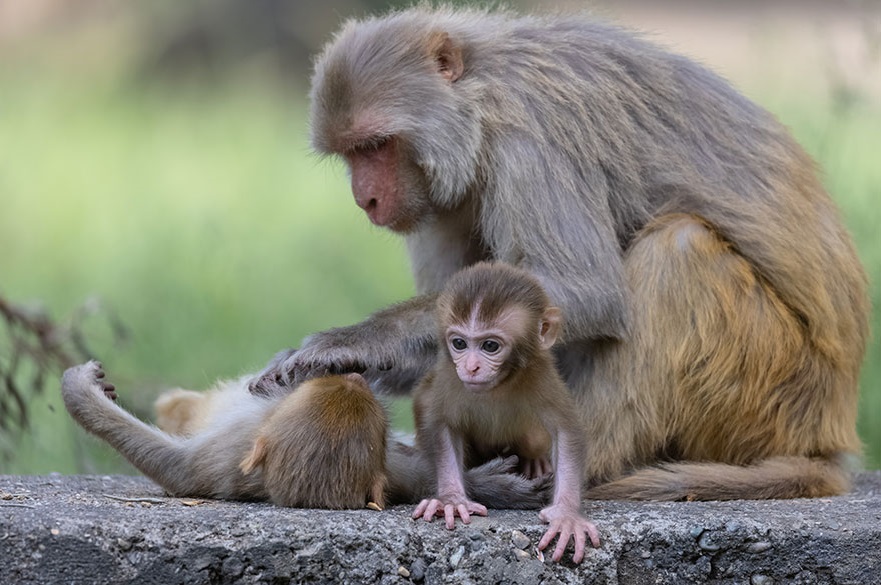Nurturing mothers help monkeys recognise key facial expressions
Baby monkeys who receive more care from their mothers develop stronger facial expression recognition skills as they grow, which could help them to navigate vital social groups more effectively.
By Helen Breese | Published on 7 April 2025
Categories: Press office; Research; School of Social Sciences;

The study by Nottingham Trent University (NTU) involved 83 rhesus macaques from 15 different social groups. Babies were observed with their mothers during their first 14 weeks of life to measure behaviours such as grooming, cradling, and mother approaching the infant
Once the macaques were at least one year old, researchers observed how they responded to images of primate faces displaying different facial expressions, such as threatening faces or submissive bared-teeth expressions.
When shown images with increasing levels of threat, their attention grew as the intensity of the threat increased, showing they were sensitive to the subtle differences in the facial expressions.
Lastly, the research tested their reaction to an unexpected change in facial expressions. The macaques were shown a sequence of five identical facial expressions, followed by one which was unexpectedly different. They spent significantly more time looking at the final, different face, suggesting they recognised the change.
Findings showed that the macaques who experienced higher quality maternal care - more grooming and cradling - during infancy were better at processing the facial expressions.
Researchers also found that facial expression processing skills improved with age until around four years old, suggesting that facial expression processing is not purely instinctive and fixed, but that experience and environmental influences play a role, much like in humans.
PhD researcher, Olivia O'Callaghan, explains the findings of the study.
Olivia O’Callaghan, PhD researcher at NTU’s School of Social Sciences, said: “Most primates are highly social animals that depend on social relationships to thrive. Having strong social connections within their group can have a positive effect on primates’ health and survival, as it could have benefits such as increased mating opportunities, access to food and protection from threats.
“The ability to interpret facial expressions is believed to help primates navigate complex social systems and hierarchies and could help them to predict future actions of group members.”
Project lead, Professor Bridget Waller, said: “Facial expression has evolved as a key method of communication in primates, including humans, and these findings show how these skills rely on social experience to develop properly.”
The work is part of a European Research Council funded project led by NTU’s Professor Bridget Waller. Individual differences in facial expressivity: Social function, facial anatomy and evolutionary origin(FACEDIFF) is an interdisciplinary project investigating the evolution of facial expression and how this results in benefits or costs in an individual’s social engagement.
Maternal care predicts facial expression processing in macaques by Olivia O’Callaghan, Dr Jamie Whitehouse, Associate Professor Annika Paukner, Dr Claire Witham (Centre for Macaques), and Professor Bridget Waller has been published in the journal iScience.
Notes for Editors
Press enquiries please contact Helen Breese, Public Relations Manager, on telephone +44 (0)115 848 8751, or via email.
About Nottingham Trent University
Nottingham Trent University (NTU) has been named UK ‘University of the Year’ five times in six years, (Times Higher Education Awards 2017, The Guardian University Awards 2019, The Times and Sunday Times 2018 and 2023, Whatuni Student Choice Awards 2023) and is consistently one of the top performing modern universities in the UK.
It is the 3rd best modern university in the UK (The Times and Sunday Times Good University Guide 2023). Students have voted NTU 1st in the UK for student employability (Uni Compare 2025)
NTU is the 5th largest UK institution by student numbers, with over 40,000 students and more than 4,400 staff located across six campuses. It has an international student population of almost 7,000 and an NTU community representing over 160 countries.
NTU owns two Queen’s Anniversary Prizes for outstanding achievements in research (2015, 2021). The first recognises NTU’s research on the safety and security of global citizens. The second was awarded for research in science, engineering, arts and humanities to investigate and restore cultural objects, buildings and heritage. The Research Excellence Framework (2021) classed 83% of NTU’s research activity as either world-leading or internationally excellent.
NTU was awarded GOLD in the national 2023 Teaching Excellence Framework (TEF) assessment, as it was in 2019.
NTU is a top 10 for sport (British Universities and Colleges Sport league table 2023).
NTU is the most environmentally sustainable university in the UK and second in the world (UI Green Metric University World Rankings, 2023).